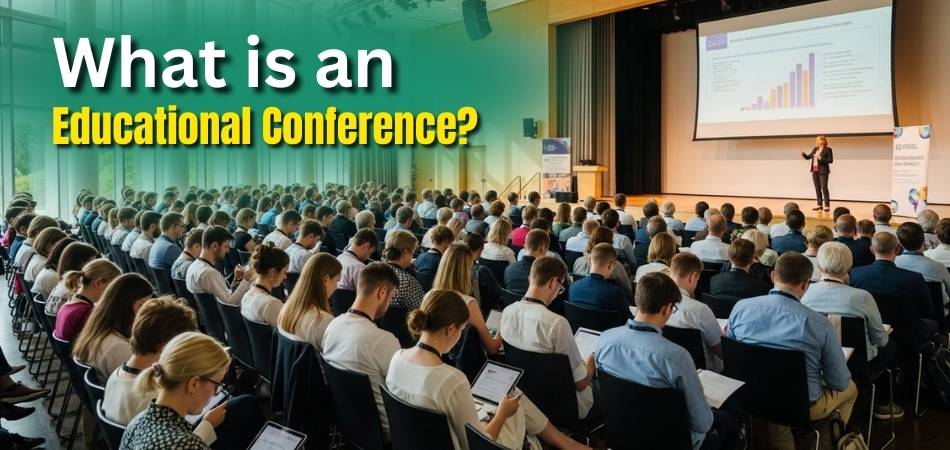People attend many types of conferences nowadays—some focus on business, others highlight science, arts, or health topics. One important type is the educational conference, where learning and teaching take center stage. Now you might have a question in mind: What is an educational conference?
An educational conference is a professional gathering where teachers, researchers, and learners share knowledge, present ideas, and discuss effective practices. These events create space for open conversations, practical workshops, and expert talks. Attendees gain new skills, understand better methods, and connect with others in the field here.
Are you curious about how these conferences work or what makes them special? Then continue reading this article, as it provides a clear explanation of all the information you require regarding educational conferences.
What is an Educational Conference?
An educational conference is a professional gathering where teachers, researchers, and learners share knowledge, present ideas, and discuss effective practices. These events create space for sharing knowledge, exploring new ideas, and improving skills that matter in classrooms and research settings. Through discussions and activities, participants learn from one another and build stronger connections with professionals working in education fields worldwide.

During such gatherings, speakers present their research, while workshops give hands-on experiences for teachers, researchers, and students to learn practical approaches. Here, attendees gain fresh insights about what works best in education and how it can help different groups. Each session encourages open communication, which allows everyone to ask questions, share opinions, and understand important changes in the learning world.
Some conferences focus on specific areas that shape learning and human understanding, including the Art, Education, and Humanities Conference in Canada, which highlights important topics. These specialized events highlight how different fields connect and influence how knowledge is shared. By attending, people strengthen their understanding and take new ideas back to their organizations or research projects. The following are some essential features of an educational conference:
- Interactive Discussions: Open conversations during sessions allow people to exchange real experiences. This helps bring out fresh thoughts and gives everyone a clear voice.
- Panel Conversations: Multiple experts share their views on one stage and compare ideas. This format allows attendees to hear different thoughts in one session.
- Presentation Slots: Participants often get the chance to present their work. It builds confidence, improves speaking skills, and brings feedback from others.
- Educational Tools Display: New learning tools, books, or teaching apps are shown at booths. Visitors try them out and learn how to use them properly.
- Live Demonstrations: Some speakers show real-time lessons, activities, or teaching methods. This hands-on display makes it easier to understand how things work.
- Paper Submission Opportunities: Conferences often accept research papers for review and display. It allows researchers to share findings and get recognition from peers.
- Certificates and Credits: Most events give certificates for attending or presenting. These often help with job promotions or fulfilling training requirements at workplaces.
- Question and Answer Sessions: At the end of talks, attendees ask direct questions to speakers. This encourages clear communication and removes confusion from the session.
Who Attends Educational Conferences?
Educational conferences are full of different kinds of people who all care about learning and improving how teaching is done. These events are not just for one group, but for many roles in education. Some share ideas, some listen and learn, and others help guide big decisions. Let’s look at who usually shows up and what they bring to the table:
School Teachers
Many teachers attend conferences to learn better ways to teach and connect with students. They enjoy sessions that give simple tips they can use. Workshops help them practice new tools or ideas with other teachers. They return to school with useful knowledge they didn’t have before.
Students and Learners
Learners who attend these events often want to explore how education works outside books. They meet experts and ask real questions during sessions. One of the main benefits of conferences for students is gaining real knowledge that helps them beyond textbooks and exams. Some also get the chance to present their ideas or small projects. It gives them confidence and real learning experiences beyond the classroom.
Academic Researchers
Researchers come to talk about what they have studied and what they have discovered. They also learn from others working on similar topics. Conferences give them a space to share ideas and improve their work. Many also find people to work with on future studies.
School Leaders
People like principals and department heads join to improve their schools or teams. They look for programs, methods, and ideas that really work. These events help them understand what’s trending in education. It helps them make smart decisions for their schools.
Education Policymakers
These are the people who make rules and plans for schools or learning systems. They attend to hear real problems and useful suggestions. Listening to teachers and experts helps them build better policies. It connects their decisions with real classroom needs.
Workshop Trainers
Trainers lead group sessions where people try out tools and methods. They often have years of experience in a topic or skill. Their goal is to keep sessions simple, fun, and clear. People walk away knowing how to use what they learned.
Types of Educational Conferences People Can Attend
Conferences for education can take many different forms, depending on their purpose and target audience. Some focus on learning new skills, while others bring people together to talk about big ideas in education. There are also events that introduce new tools or help make future plans. Let’s explore the different kinds of conferences people often attend.
Academic Conferences
These focus mainly on research and study-related topics within a specific subject. Experts and scholars present their latest findings and discuss ideas. These events are calm, thoughtful, and packed with knowledge sharing. People attending usually write research papers or are involved in higher studies. It’s a great space for deep learning and academic talk.
Professional Development Conferences
Those who wish to improve their classroom management or teaching skills can take advantage of these conferences. There are workshops, talks, and group tasks led by skilled experts. You get to learn the latest methods in teaching or schoolwork. It helps people grow and do better in their daily work. This type of conference is very active and full of energy.
Technology Conferences
Utilizing technology and digital tools for learning is the main focus of this type of conference. You’ll see gadgets, learning apps, and smart ways to teach online. Speakers talk about how tech can make classes better and faster. It’s great for people who love new ideas and smart tools. You can try out devices and software right there as well.
Policy Conferences
People who plan or improve school systems come together in these educational meetings. They talk about the rules, plans, and big decisions that shape how schools run. Teachers, leaders, and decision-makers join to share what works and what needs change. It’s a space where real change begins and ideas are turned into action. These talks help build a better future for education.
Teacher and Educator Conferences
These are special educational events made just for teachers to help them do their job better. There are training sessions, material sharing, and fun group discussions. Teachers meet others, learn from them, and also share what works in their own class. This helps build support and friendship among people doing similar work. It’s friendly, helpful, and full of useful ideas.
Administrator Conferences
School heads, administrators, and decision-makers are the target audience for these events. They focus on leadership, management, and improving how schools are run. Strategies for building stronger teaching teams are often discussed here. Attendees get practical advice on how to make schools better. It’s a place for sharing challenges and finding working solutions.
Student Learning Conferences
These are meetings where teachers and parents directly talk about a student’s progress. They focus on strengths, weaknesses, and ways to improve learning. Parents get updates and share their thoughts with teachers. These talks help everyone understand what a student needs. They are very personal and supportive for learning growth.
EdTech Professional Conferences
People who work with education software, apps, or tools attend these to share updates and plans. New inventions and tools are introduced and tested by the crowd. It’s also a place to meet companies or experts who build these tools. You’ll see how technology is growing and where it’s going. This education event is perfect for anyone working in the tech side of learning.
Is Joining an Educational Conference a Challenging Process?
No, joining an educational conference is usually not very difficult if you follow the right steps carefully. Many people think it takes too much effort, but most conferences are well-organized to guide participants. From registration to attending sessions, the process is straightforward with some planning. Read below to understand how you can join an educational conference smoothly.
Finding the Right Event
The first step is knowing which conference matches your interests and needs. Some focus on teaching, while others highlight research or technology. Reading the event details carefully will help you decide if it’s worth attending. Checking reviews or feedback from past events can also guide your choice. Picking the right event makes your experience more meaningful.
Registration Process
Signing up via the conference’s official website is the next step. Most conferences offer simple online forms to fill in details. You usually need to provide your name, contact information, and area of interest. Some conferences require a small fee for participation. Once completed, you will get a confirmation email with all the instructions.
Payment and Fees
Many conferences ask for a registration fee that covers entry, sessions, and sometimes meals or materials. The amount depends on the event type and scale. Payments are often accepted online through secure options like cards or transfers. Some conferences offer early-bird discounts for those who register quickly. Paying on time helps secure your spot without stress.
Submission of Papers
Academic conferences often ask participants to share research papers or presentations. If you plan to present, you need to follow the given guidelines. The submission is usually online, with deadlines mentioned clearly on the event page. Once reviewed, you’ll be informed if your work is accepted. This adds value to your participation and helps share your knowledge.
Travel and Stay
If the conference is in another city or country, planning travel is important. Attendees usually book tickets and hotels early to save money. Many conference websites suggest nearby hotels for easy access. Some even partner with travel services to give discounts. Preparing early avoids last-minute stress and helps you focus on the event.
Participation in Sessions
Once you reach the conference, you get access to workshops, seminars, and talks. You usually receive a schedule of sessions to choose from. Attendees can attend keynotes, join group discussions, or explore exhibitions. Participation is simple; just follow the directions given by organizers. This makes learning and networking both easy and enjoyable.
Tips for Getting the Most Out of an Educational Conference
Attending an educational conference can be an exciting experience with so many sessions, people, and ideas to explore. Some may feel unsure about how to get the best value from these events. With the right steps, you can make it simple and useful. Keep reading to learn the best tips for making your conference experience successful.
Plan Ahead
Before attending, take time to check the schedule and note the sessions that interest you most. Planning helps you avoid missing important talks or workshops. It also allows you to make the most of your time. A clear plan keeps you focused and less stressed.
Set Clear Goals
Think about why you are attending and what you want to achieve from the event. Knowing the purpose of an international education conference helps you stay focused and choose the right sessions. It could be learning a new method, meeting experts, or exploring new tools. Clear goals will guide your choices throughout the conference.
Join Discussions
Conferences are not only about listening but also about sharing. Ask questions and take part in group talks whenever possible. Sharing your views helps you connect with others in a meaningful way. Active involvement makes the experience more valuable and memorable.
Network With Others
Meeting people is one of the biggest advantages of a conference. Take chances to talk with teachers, researchers, or professionals. Exchanging contacts can open doors for future collaborations. These connections often continue even after the event ends.
Take Good Notes
Write down key points, new ideas, or important contacts during each session. Notes help you remember what you learned later. You can also share them with colleagues who didn’t attend. Good notes become useful references when applying new ideas.
Explore Exhibits
Many conferences have stalls or exhibits that display new tools and resources. Take time to explore these areas and learn about new products. Trying them firsthand gives you a clear understanding of how they work. You might find something very useful for your needs.
Review and Apply
After the conference, spend time going through everything you learned. Highlight the parts that can be applied in your daily work. Share insights with your peers to spread the benefits. Applying knowledge right away ensures you get lasting value.
Frequently Asked Questions
Educational conferences bring together a mix of people, sessions, and activities that create powerful learning experiences. While the basics are often clear, many people still have questions about the finer details. Here are some commonly asked questions with clear answers to help you understand everything better.
How Do Educational Conferences Differ From Regular Seminars?
Educational conferences are usually larger and cover multiple sessions, workshops, and keynote speeches across different topics. Regular seminars often focus on one subject or a single speaker. Conferences allow participants to connect with many professionals and explore a broader range of educational themes in one place.
What Makes Keynote Sessions Important at Conferences?
Keynote sessions are usually led by experienced professionals or education experts. They share big ideas that set the theme for the entire event. These talks inspire attendees, provide fresh perspectives, and guide participants on what to expect from other sessions during the conference.
How Long Do Educational Conferences Usually Last?
An educational conference can last one day, two days, or even a week depending on the scale. Large events often include multiple sessions, workshops, and exhibitions spread over several days. Shorter ones focus on fewer sessions but still offer valuable content for attendees.
What Role Do Sponsors Play in Educational Conferences?
Sponsors support conferences by providing financial help or resources. They may set up booths to show their products, like books or learning tools. Their support makes it possible for conferences to run smoothly and sometimes even reduces fees for participants.
Can Attendees Receive Professional Recognition From Conferences?
Yes, many educational conferences are recognized by professional bodies and institutions. Attending or presenting at one can count as professional development. Certificates or recognition from such events can strengthen resumes and provide career benefits for teachers, researchers, or administrators.
What Role Do Publishers Play at Conferences?
Publishers often attend to showcase textbooks, guides, and academic resources. They provide teachers and researchers with the latest materials in education. Many also offer discounts or samples, giving participants a chance to explore resources they might later use in their classrooms or projects.
How Can Networking at Conferences Improve Careers?
Networking gives participants direct access to professionals in the same field. Meeting new contacts can lead to research collaborations, job opportunities, or invitations to future events. Building these connections often helps careers grow faster than working alone in isolation.
Final Thoughts
Educational conferences are more than just events with sessions and speakers; they bring people together to share real knowledge and fresh ideas. They create space where learning is active, useful, and connected to real-world education needs.
Whether you’re a teacher, student, researcher, or leader, these conferences offer something that can help you grow. From hands-on workshops to meaningful discussions, the experience is full of learning and practical value.
So, if you are still asking, What is an educational conference?, the answer is simple: it’s a place to learn, connect, and build better ways to teach and understand. And now that you know what it’s all about, you’re ready to explore the rest of this topic with confidence.







